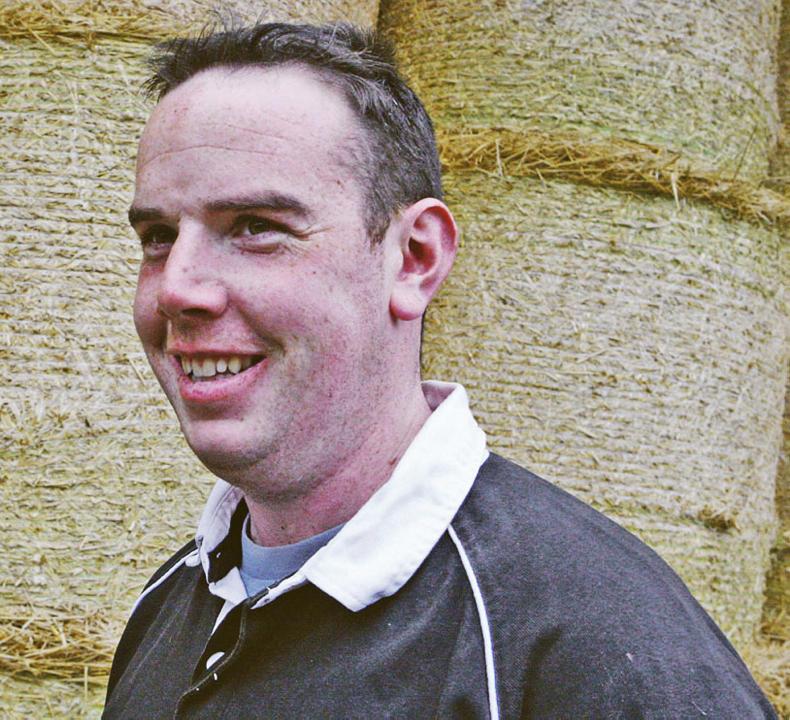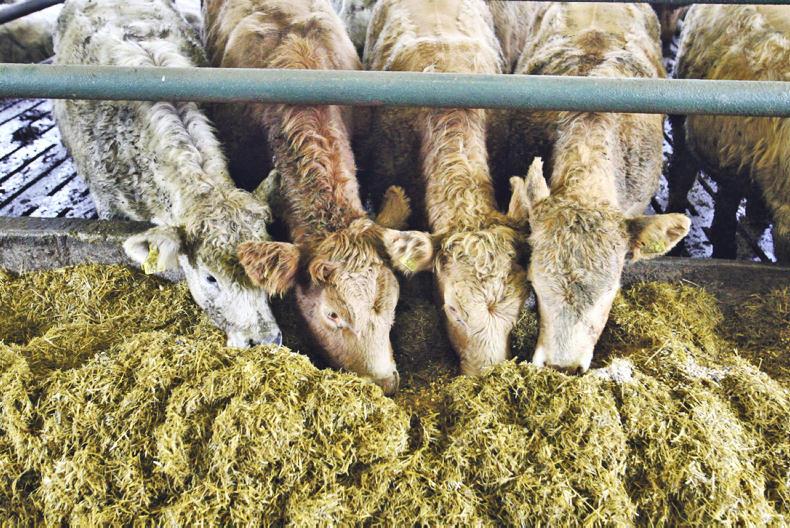 Thomas runs a herd of 100 Limousin-cross suckler cows in partnership with his parents, Tom and Monica, at Moone, Co Kildare. The cows are bred to Charolais bulls and heifers are bred to Limousin bulls.
Thomas runs a herd of 100 Limousin-cross suckler cows in partnership with his parents, Tom and Monica, at Moone, Co Kildare. The cows are bred to Charolais bulls and heifers are bred to Limousin bulls.
They buy in 20 weanling bulls each autumn and all animals are finished on the farm. Twenty weanling heifers are also purchased in the autumn, mainly for replacements. All male progeny are finished as bull beef and heifers are brought to slaughter at 23 months.
The beef animals are sold to Dunbia in Slane. The best 30 of this year’s bulls were sold before the end of June. They were under 16 months and averaged 390kg.
Award
Thomas O’Connor is an outstanding young farmer. He won the FBD Young Beef Farmer of the Year award in 2015 and was one of the six finalists in the prestigious FBD Young Farmer of the Year, organised by Macra na Feirme.
Excellent grassland management is one of the hallmarks of this farm, with most of the farm reseeded over the past 20 years.
Animal health is another area where attention to detail is very obvious, with detailed vaccination programmes in place to protect against pneumonia and IBR (Infectious Bovine Rhinotracheitis). Vaccination to protect against calf sour is also a critical component of the animal health plan.
Rigid vaccination programme in place
A rigid pneumonia vaccination programme has been in place for the last eight years. This has paid dividends in healthy stock and high performance.
All weanlings are vaccinated with Bovipast® RSP. It is the only vaccine that protects against pasteurella pneumonia (caused by the bacteria Mannheimia haemolytica) as well as the two main viruses, BRS-Virus (Bovine Respiratory Syncytial virus) and PI-3 virus (Parainfluenza 3 virus).
“All our home-born weanlings get their first shot of Bovipast® RSP in the first week of August. They get their booster shot four weeks later. They are also given Bovilis® IBR Marker Live at the same time as the booster shot of Bovipast® RSP,” said Thomas.
Bovilis® IBR Marker Live protects against IBR (Infectious Bovine Rhinotracheitis). Recent research has shown that almost three-quarters of all suckler and dairy herds are positive to the IBR virus.
Thomas regards vaccination against pneumonia for bought-in weanlings as “a non-negotiable practice”. The weanlings are bought in marts which are a stressful environment where cattle harbouring a multitude of different bacteria and viruses have a chance to mix.
“All our bought-in weanlings get a shot of Bovilis® IBR Marker Live when they arrive on the farm. They get their first shot of Bovipast® RSP a week later and a booster shot four weeks later. They are kept separate from the rest of the herd for at least two weeks,” said Thomas.
Cheap
“For me, vaccinating all weanlings with Bovipast® RSP is just vital and is cheap compared to the cost of treating sick animals with antibiotics, not to mention the impact of a pneumonia outbreak on performance, even in animals that appear to have fully recovered,’’ he added.
He works very closely with his veterinary practice in ensuring that his animal health programme is continually fine-tuned. IBR is another disease that is given top priority on the farm and not just in younger stock.
Tests
All finishing bulls and heifers are given a shot of Bovilis® IBR Marker Live when they are housed. The results of blood tests and nasal swab tests in early 2015 showed that cows were positive to the IBR virus. As a result, all cows were given a shot of Bovilis® IBR Marker Live a month before calving. This has now become a permanent feature of the animal health programme.
Vaccination to protect against calf scour is also included in the animal health plan. Cows are given a single dose vaccine at least three weeks before calving to provide immunity in the colostrum against rotavirus, coronavirus and E coli.
Family partnership running well
Thomas, Tom and Monica set up a family partnership at the beginning of 2015. This gives both parties equal say in the running of the business which also includes sheep, tillage and pig enterprises.
All parties are happy with the way the partnership is running.
The sheep flock consists of 100 Belclare/Suffolk ewes and 40 ewe lambs. Lambing is due to start in mid-December and will be over before the busy calving season gets under way.
Around 45 acres of winter barley and winter wheat are grown on the farm. The pig enterprise consists of 30 sows, with all progeny reared to slaughter. Pigs have been a feature since Thomas’s grandfather ran the farm.
Thomas also finds time to play an active role in Macra na Feirme and is chair of the recently formed south Kildare branch.
 Thomas runs a herd of 100 Limousin-cross suckler cows in partnership with his parents, Tom and Monica, at Moone, Co Kildare. The cows are bred to Charolais bulls and heifers are bred to Limousin bulls.
Thomas runs a herd of 100 Limousin-cross suckler cows in partnership with his parents, Tom and Monica, at Moone, Co Kildare. The cows are bred to Charolais bulls and heifers are bred to Limousin bulls.
They buy in 20 weanling bulls each autumn and all animals are finished on the farm. Twenty weanling heifers are also purchased in the autumn, mainly for replacements. All male progeny are finished as bull beef and heifers are brought to slaughter at 23 months.
The beef animals are sold to Dunbia in Slane. The best 30 of this year’s bulls were sold before the end of June. They were under 16 months and averaged 390kg.
Award
Thomas O’Connor is an outstanding young farmer. He won the FBD Young Beef Farmer of the Year award in 2015 and was one of the six finalists in the prestigious FBD Young Farmer of the Year, organised by Macra na Feirme.
Excellent grassland management is one of the hallmarks of this farm, with most of the farm reseeded over the past 20 years.
Animal health is another area where attention to detail is very obvious, with detailed vaccination programmes in place to protect against pneumonia and IBR (Infectious Bovine Rhinotracheitis). Vaccination to protect against calf sour is also a critical component of the animal health plan.
Rigid vaccination programme in place
A rigid pneumonia vaccination programme has been in place for the last eight years. This has paid dividends in healthy stock and high performance.
All weanlings are vaccinated with Bovipast® RSP. It is the only vaccine that protects against pasteurella pneumonia (caused by the bacteria Mannheimia haemolytica) as well as the two main viruses, BRS-Virus (Bovine Respiratory Syncytial virus) and PI-3 virus (Parainfluenza 3 virus).
“All our home-born weanlings get their first shot of Bovipast® RSP in the first week of August. They get their booster shot four weeks later. They are also given Bovilis® IBR Marker Live at the same time as the booster shot of Bovipast® RSP,” said Thomas.
Bovilis® IBR Marker Live protects against IBR (Infectious Bovine Rhinotracheitis). Recent research has shown that almost three-quarters of all suckler and dairy herds are positive to the IBR virus.
Thomas regards vaccination against pneumonia for bought-in weanlings as “a non-negotiable practice”. The weanlings are bought in marts which are a stressful environment where cattle harbouring a multitude of different bacteria and viruses have a chance to mix.
“All our bought-in weanlings get a shot of Bovilis® IBR Marker Live when they arrive on the farm. They get their first shot of Bovipast® RSP a week later and a booster shot four weeks later. They are kept separate from the rest of the herd for at least two weeks,” said Thomas.
Cheap
“For me, vaccinating all weanlings with Bovipast® RSP is just vital and is cheap compared to the cost of treating sick animals with antibiotics, not to mention the impact of a pneumonia outbreak on performance, even in animals that appear to have fully recovered,’’ he added.
He works very closely with his veterinary practice in ensuring that his animal health programme is continually fine-tuned. IBR is another disease that is given top priority on the farm and not just in younger stock.
Tests
All finishing bulls and heifers are given a shot of Bovilis® IBR Marker Live when they are housed. The results of blood tests and nasal swab tests in early 2015 showed that cows were positive to the IBR virus. As a result, all cows were given a shot of Bovilis® IBR Marker Live a month before calving. This has now become a permanent feature of the animal health programme.
Vaccination to protect against calf scour is also included in the animal health plan. Cows are given a single dose vaccine at least three weeks before calving to provide immunity in the colostrum against rotavirus, coronavirus and E coli.
Family partnership running well
Thomas, Tom and Monica set up a family partnership at the beginning of 2015. This gives both parties equal say in the running of the business which also includes sheep, tillage and pig enterprises.
All parties are happy with the way the partnership is running.
The sheep flock consists of 100 Belclare/Suffolk ewes and 40 ewe lambs. Lambing is due to start in mid-December and will be over before the busy calving season gets under way.
Around 45 acres of winter barley and winter wheat are grown on the farm. The pig enterprise consists of 30 sows, with all progeny reared to slaughter. Pigs have been a feature since Thomas’s grandfather ran the farm.
Thomas also finds time to play an active role in Macra na Feirme and is chair of the recently formed south Kildare branch.
 Thomas runs a herd of 100 Limousin-cross suckler cows in partnership with his parents, Tom and Monica, at Moone, Co Kildare. The cows are bred to Charolais bulls and heifers are bred to Limousin bulls.
Thomas runs a herd of 100 Limousin-cross suckler cows in partnership with his parents, Tom and Monica, at Moone, Co Kildare. The cows are bred to Charolais bulls and heifers are bred to Limousin bulls. 





 This is a subscriber-only article
This is a subscriber-only article






